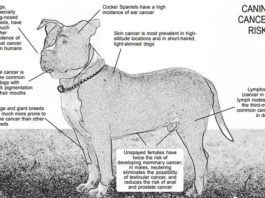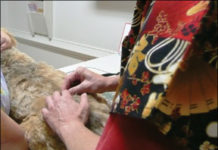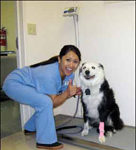Special Diets for Dogs With Cancer
In the relationship between cancer and nutrition, there are few conclusive answers. The modalities of both are complex, and neither is completely understood. However, enhanced nutrition is of unquestionable benefit to any dog with cancer, and to any dog with an increased risk of developing cancer. And of the many known factors leading to canine cancer, proper nutrition is the one which dog owners can best control, enhancing a dog's overall health, and improving the body's natural defense against cancer. Those positive words must be followed with some cautions. Cancer diets often emphasize or restrict certain nutrients, in order to promote certain biochemical actions or to thwart others.
Canine Lipomas
Lumps, bumps, fatty tumors – call them what you will, but nobody likes to see her dog develop lipomas, those persistent little foothills that can sprout up on older dogs – and sometimes, not so-old ones. Often soft and squishy to the touch, benign fatty tumors are not a threat to your dog’s health. (The exception is infiltrative lipomas, which can invade muscle tissue, but these are relatively rare.) While lipomas can be unsightly, many vets opt not to remove them unless they are in a location where their growth impedes a dog’s mobility. But many holistic veterinarians see lipomas as far from innocuous. Instead, they stress, lipomas are symptoms of a bigger problem.
Canine Cancer Therapy Update
Despite everything modern medicine has to offer, cancer in dogs remains among the most feared of canine diseases. Just over a year ago, Whole Dog Journal reviewed conventional, complementary, and alternative cancer therapies in a series of articles. Since then, a cancer vaccine has been approved for veterinary use and a new version of an old herbal salve has become a “first choice” for many holistic veterinarians.
What Are the Alternatives for Treating Cancer in Dogs?
The high-tech world of modern medicine has so many weapons that its “war on cancer” arsenal promises something for everyone. But all along, there have been patients, physicians, veterinarians, and animal caregivers who refuse chemotherapy, radiation treatments, surgery, prescription drugs, and other oncology protocols.
Acupuncture For Dogs With Cancer
without any hesitation
Identifying Tumors on Your Dog
anyway. In this case
Bone Marrow Transplants Offer a Promising Treatment for Canine Lymphoma
Exciting news regarding bone marrow transplants for dogs with lymphoma has recently emerged. North Carolina State University’s College of Veterinary Medicine in Raleigh is the first university in the world to open a canine clinical bone marrow transplant (BMT) unit. Dr. Steven Suter, assistant professor of veterinary oncology at NCSU, is about to perform his 30th transplant, all done over the past two years. Lymphoma, also called lymphosarcoma, is one of the most common cancers to occur in dogs. While it used to be considered a disease of middle-aged and older dogs, those demographics have changed in the past 5 to 10 years, with more and more young dogs being diagnosed. Golden Retrievers have a particularly high risk for this type of cancer.
Canine Cancer Crisis
Cancer has to be the most feared diagnosis in all of medicine, one that sends patients and their families on a bewildering journey through statistics, treatment options, and life-or-death decisions that have to be made right now. Cancer has become so widespread that the care and treatment of its human patients is one of the world’s largest industries. Now cancer affects a significant percentage of veterinary patients as well.
Do Your Homework
His research and willingness to innovate pays off, as this dedicated owner helps his dog outlive her diagnosis.
Daisy’s Chemotherapy Day
We arrive at the veterinary clinic at 7:45 AM. Daisy leaps out of the car and heads for the grass in front of the door; after a long squat, she makes a beeline for the entrance, pulling me behind her. It's always at this point I watch carefully to see if I can observe any signs of distress or apprehension about this almost weekly visit.Instead, she is excited about going in to seeing her buddies; if I were a betting person, I would put money on the notion that she enjoys these outings.
Don’t Despair; Just Care
Holistic care and home support are effective for treating canine cancer.
Conventional Cancer Care for Canine
Your nagging feeling was right – there really is something wrong with your dog. And it’s not just a pulled muscle or a torn toenail. It’s cancer. As you struggle to wrap your mind around that diagnosis, the veterinarian describes your options: surgery, radiation, or chemotherapy, alone or in combination. Or your dog might be eligible to participate in a clinical trial testing a new drug, or you may want to consult an oncology specialist or consider a promising new state-of-the-art treatment. There are no guarantees that any of these treatments will work, and if the prognosis is especially grim, you may want to say goodbye now. Please decide within 24 hours. This is a medical emergency.

















